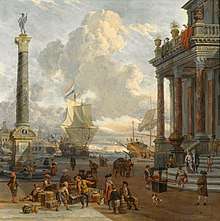Trade war
| Part of a series on |
| World trade |
|---|
 |
A trade war is an economic conflict resulting from extreme protectionism in which states raise or create tariffs or other trade barriers against each other in response to trade barriers created by the other party.[1] Increased protection causes both nations' output compositions to move towards their autarky position.[2]
Trade wars could escalated to full conflict between states, as evidenced in the First Opium War which started after the Qing government blockaded its ports and confined British traders, resulted in the dispatch of British Navy to China and engage the Chinese Navy in Battle of Kowloon.
Some economists agree that certain economic protections are more costly than others, because they may be more likely to trigger a trade war. For example, if a country were to raise tariffs, then a second country in retaliation may similarly raise tariffs. An increase in subsidies, however, may be difficult to retaliate against by a foreign country.
Trade wars and protectionism have been implicated by some scholars as the cause of some economic crises, in particular the Great Depression.[3] Unlike most other types of conflict, trade wars have a reputation for having only losers and no winners, due to the high cost and lack of benefits for any of the participants.
See also
- Anglo-Irish Trade War (1932–1938)
- Currency war
- Customs war
- Economic sanctions
- Smoot–Hawley Tariff Act, a United States Act implementing protectionist trade policies
- Trade war over genetically modified food
- Trump tariffs
- Banana Wars
- China–United States trade war
References
- ↑ "What is trade war? definition and meaning". BusinessDictionary.com. Retrieved 2017-08-15.
- ↑ Staff, Investopedia (28 September 2009). "Trade War".
- ↑ Irwin, Douglas (2017). Peddling Protectionism: Smoot-Hawley and the Great Depression. Princeton University Press. p. vii-xviii.